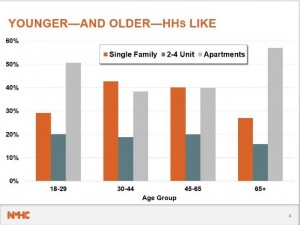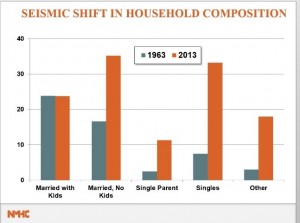This website uses cookies so that we can provide you with the best user experience possible. Cookie information is stored in your browser and performs functions such as recognising you when you return to our website and helping our team to understand which sections of the website you find most interesting and useful.
News
Why Urbanization and Millennials Will Rule the Housing Market
After almost a decade of lower housing starts, the pent-up demand for new homes has people who follow the housing market optimistic about the coming decade. Two of them, Kenny Emson of the National Multifamily Housing Council and Ken Gear of Leading Builders of America, talked to The Vinyl Institute about housing trends, including urbanization and the key role that millennials will play in shaping the future of housing in America.
Think urbanization.
Kenny Emson stressed that urbanization is here to stay—and that the majority of the population will end up concentrated in 12-16 urban areas around the country.
Emson pointed to the importance of the service industry to America’s global competitiveness and said that service industry jobs will be concentrated in urban areas. “We’re going to have, and we already have higher density,” he said. “The localities that are preparing themselves for it are the ones that are going to succeed.”
Figure out what millennials want.
Ken Gear noted that there will be eight million new millennial households in the next few years. “Millennials are going to shape and dominate the market,” he said, “so you better figure out how to get them to buy your products.”
Gear said that, as pent-up demand re-energizes the market after almost a decade of lower housing starts, a lot of new home buyers will be millennials. He noted that younger buyers “are looking for more sustainable homes, energy-efficient homes, and automated and interactive homes.” As a result, he added, “there will be a lot of opportunity in home design and a lot of modern materials coming into homes.”
Gear also pointed out that women typically make the decision on home buying (and home features and fixtures). He added that the more vinyl products are marketed to women, “you’ll be ahead of the game.”
Apartments are hot.




Condominiums are appreciating in value faster than single-family homes, according to Zillow’s October 2015 Real Estate Market Report. And apartment living is highly desired, according to Kenny Emson.
Emson said that about one-third of people in the U.S. rent, and that younger (think millennials) and older adults alike are attracted to apartment living. So are single people—and the shift in household composition over the last 50 years suggests that apartments will continue to be a hot commodity.
Key challenges remain.
Despite the rosy housing forecast, big challenges remain. Ken Gear said that key challenges include mortgage liquidity and the regulatory environment.
Gear said new regulations have made getting a mortgage extremely difficult. He pointed to the Dodd-Frank bill as one culprit, saying that it has impacted how the mortgage industry operates and depressed the ability, actual and perceived, to qualify for a mortgage. Gear also singled out the way that Congress handles Fannie Mae and Freddie Mac. He said that, by law, all of their profits go into the general treasury. He warned that “the profits are not being saved for the next downturn and to build up a safety net for that eventuality.”
Finally, Gear said that there is a critical labor shortage in the housing sector. He noted that while home sales are up by 21 percent, the number of available skilled workers is up by only four percent. Gear said that skilled work has been devalued, and that vocational education has been defunded across school systems. Gear called the labor shortage “a critical, top-of-mind issue.” Gear concluded by saying that his organization is looking at ways to work with community colleges to address the skills gap.


